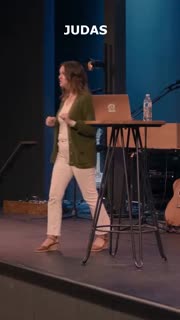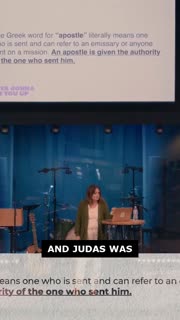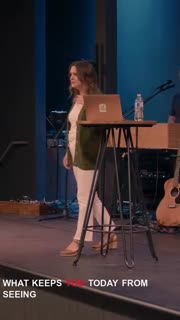Judas Iscariot: A Cautionary Tale of Betrayal
Devotional
Sermon Summary
Bible Study Guide
Sermon Clips
1. "How is it, and this happens in a family, not just in a church, but how is it that people can be a part of a community, serve together, experience the same serving opportunities, hear the same teaching, how is it that some in that same exact environment learn what it is to, deny themselves, pick up their cross, and follow Jesus, and thrive, and never look back? But others in that same environment seemingly come in and follow Jesus, but then fall away at some point." [43:45] (37 seconds)
2. "We get to learn lessons from watching other people, what they do, what they don't do, that we never have to learn on our own if we do it right. For example, from movies, I have learned that if somebody offers me a golden ticket to a chocolate factory, I am not taking it, because on the other side of that golden ticket is the most terrifying person in all of cinema, Gene Wilder's Willy Wonka. Are you kidding me? He has scarred me for life." [45:25] (26 seconds)
3. "And I think Judas is a great candidate for this kind of storytelling, because if we took his famous moment, where he betrays Jesus in the garden, and we put it against some of those Monday moments, three years earlier, or two weeks earlier, where he was sharing a meal with Jesus, where he was going out with Jesus, and that he was amongst all the 11 disciples, we would exclaim also, how do they let that traitor in the midst? How did he get there? How did that happen?" [49:18] (29 seconds)
4. "And Judas was an apostle. And this meant that he was sent out with authority. Matthew 10 tells us, in verse one, Jesus called the 12 disciples to him and gave them authority to drive out impure spirits and to heal every disease and sickness. And then it goes on to say that Jesus sent out the 12 with the explicit instructions, instructions to use the authority that he had given them. In verse 8, we read, heal the sick, raise the dead, cleanse those who have leprosy, drive out demons. Freely you have received, freely give." [53:18] (38 seconds)
5. "And yet he also, we read, was a thieving treasurer and a premeditated betrayer of Jesus. John has a lot to say about Judas that we don't get in the other disciples, more than the gospel writers, and he says, that Jesus once said to the 12, one of you is the devil. And then he, in parentheses, says he meant Judas, but we have nowhere in the text that indicates that the other disciples knew at the time what was going on. They didn't know. It's only in retrospect that they put those puzzle pieces in, like, oh yeah, this is what was going on." [55:54] (36 seconds)
6. "And Judas identified Jesus with a greeting and a kiss. And in that moment, set into motion the thing that would change all of human history, all of it. And the reason I read Matthew's account, though you can read in all four gospels of this betrayal moment, is because Matthew says this one little bit here that nobody else adds. My friend, I think, though I can't prove it in the scripture, but when I put my friend up against all of the generations of moments in the Old Testament, all leading up to this one moment, I think my friend is an invitation from Jesus. Repent. It's not too late. The come home." [01:07:44] (52 seconds)
7. "And so here is the sliding doors moment. What if, what might have been is, what if Judas had taken Matthew, I'm sorry, Matthew, what Matthew tells us, had taken Jesus up on this invitation? What if he had thrown himself at the feet of Jesus? My Lord, my God, I'm so sorry. What have I done and repented? Might he, might he have received the same forgiveness, the same redemption, the same grace that Peter got from Jesus? Might he have joined the other disciples to set the world on fire with the truth and the redemption of Jesus?" [01:08:55] (43 seconds)
8. "What keeps you today from seeing yourself in Judas? And what stops you from accepting the redemption and the forgiveness of Jesus today? It's friends, my friends. As somebody who's observed many, many people in church walk away from Jesus, I would beseech you to cry out every day, search me, oh God, and know my hearts, know my heart. But also, what keeps you from accepting the love and the redemption and the forgiveness of Jesus? It's never too late." [01:11:21] (36 seconds)
Ask a question about this sermon
2. "We get to learn lessons from watching other people, what they do, what they don't do, that we never have to learn on our own if we do it right. For example, from movies, I have learned that if somebody offers me a golden ticket to a chocolate factory, I am not taking it, because on the other side of that golden ticket is the most terrifying person in all of cinema, Gene Wilder's Willy Wonka. Are you kidding me? He has scarred me for life." [45:25] (26 seconds)
3. "And I think Judas is a great candidate for this kind of storytelling, because if we took his famous moment, where he betrays Jesus in the garden, and we put it against some of those Monday moments, three years earlier, or two weeks earlier, where he was sharing a meal with Jesus, where he was going out with Jesus, and that he was amongst all the 11 disciples, we would exclaim also, how do they let that traitor in the midst? How did he get there? How did that happen?" [49:18] (29 seconds)
4. "And Judas was an apostle. And this meant that he was sent out with authority. Matthew 10 tells us, in verse one, Jesus called the 12 disciples to him and gave them authority to drive out impure spirits and to heal every disease and sickness. And then it goes on to say that Jesus sent out the 12 with the explicit instructions, instructions to use the authority that he had given them. In verse 8, we read, heal the sick, raise the dead, cleanse those who have leprosy, drive out demons. Freely you have received, freely give." [53:18] (38 seconds)
5. "And yet he also, we read, was a thieving treasurer and a premeditated betrayer of Jesus. John has a lot to say about Judas that we don't get in the other disciples, more than the gospel writers, and he says, that Jesus once said to the 12, one of you is the devil. And then he, in parentheses, says he meant Judas, but we have nowhere in the text that indicates that the other disciples knew at the time what was going on. They didn't know. It's only in retrospect that they put those puzzle pieces in, like, oh yeah, this is what was going on." [55:54] (36 seconds)
6. "And Judas identified Jesus with a greeting and a kiss. And in that moment, set into motion the thing that would change all of human history, all of it. And the reason I read Matthew's account, though you can read in all four gospels of this betrayal moment, is because Matthew says this one little bit here that nobody else adds. My friend, I think, though I can't prove it in the scripture, but when I put my friend up against all of the generations of moments in the Old Testament, all leading up to this one moment, I think my friend is an invitation from Jesus. Repent. It's not too late. The come home." [01:07:44] (52 seconds)
7. "And so here is the sliding doors moment. What if, what might have been is, what if Judas had taken Matthew, I'm sorry, Matthew, what Matthew tells us, had taken Jesus up on this invitation? What if he had thrown himself at the feet of Jesus? My Lord, my God, I'm so sorry. What have I done and repented? Might he, might he have received the same forgiveness, the same redemption, the same grace that Peter got from Jesus? Might he have joined the other disciples to set the world on fire with the truth and the redemption of Jesus?" [01:08:55] (43 seconds)
8. "What keeps you today from seeing yourself in Judas? And what stops you from accepting the redemption and the forgiveness of Jesus today? It's friends, my friends. As somebody who's observed many, many people in church walk away from Jesus, I would beseech you to cry out every day, search me, oh God, and know my hearts, know my heart. But also, what keeps you from accepting the love and the redemption and the forgiveness of Jesus? It's never too late." [01:11:21] (36 seconds)








